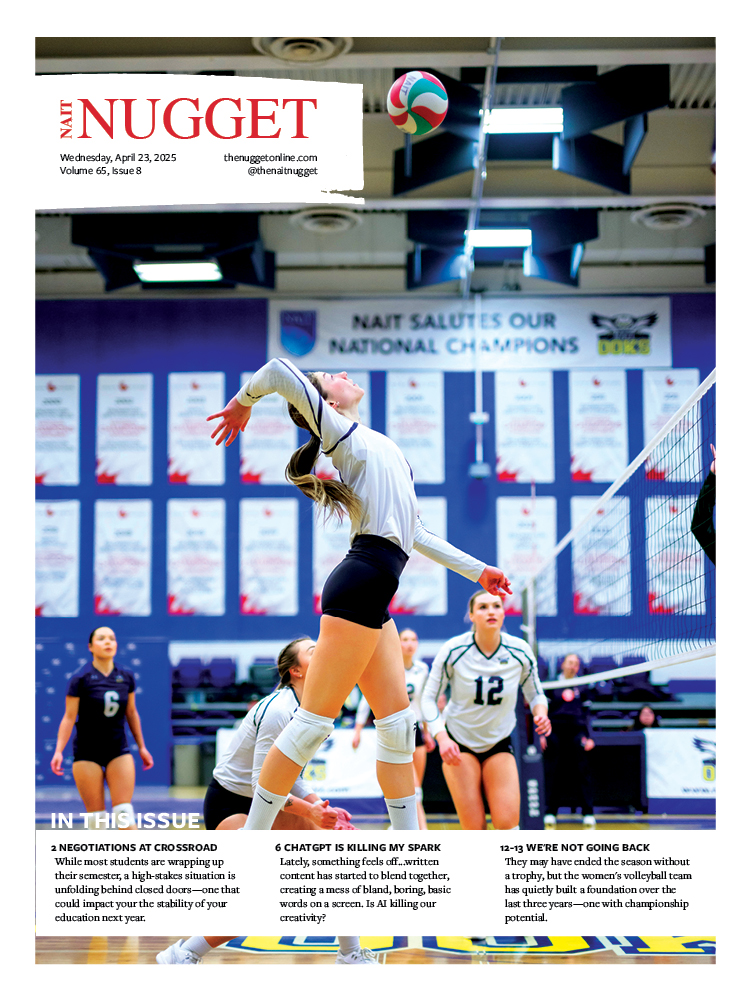As the dust settles after NAIT’s announcement that 18 programs would be paused for review, the NAIT community is reacting. From the chosen programs to the rushed timeline, students, staff and industry are sharing their concerns about this decision.
“The NAIT Students’ Association (NAITSA) is expressing serious concern regarding the Northern Alberta Institute of Technology’s decision to pause 18 academic programs,” NAITSA said in a press release. The statement explained that typically, the institution’s Academic Council must review academic program changes, which NAIT did not do before announcing the pauses—a decision NAITSA called “troubling and inappropriate.”

“NAITSA believes that failing to follow proper process undermines accountability and transparency within the institution and calls on NAIT to reverse course and engage in meaningful consultation with all affected stakeholders,” the press release said.
NAIT announced the pause on May 15, and on May 23, they posted an announcement that they were now entering an engagement phase. “These conversations will inform recommendations to NAIT’s Academic Council and Board of Governors—and ultimately, the Ministry of Advanced Education for final decisions,” said the press release.
The NAIT Academic Staff Association (NASA) told media that upwards of 100 staff may be impacted by the decision.
NASA President Shauna MacDonald said there has been “a lot of reaction, and a lot of panic, and a lot of worry.”
“For staff, it’s not great. We’re getting ready to prepare for our fall term, and now they’re not preparing, and they don’t know if they have jobs,” MacDonald told press after NAIT’s May 15 announcement.
MacDonald also expressed concern about how these program pauses may impact tuition—NAIT is capped at a 2 per cent increase for current programs, but the institution has freedom to set tuition rates for new programs. “They mentioned increasing access for students, but one of my worries is that this increasing access will come at a cost to students … if they revamp a program, they can set the tuition,” she said.
NAIT explained that the paused programs “are among [their] highest-cost offerings with lower enrolment and/or completion rates.” They cited financial pressures from factors like lower international tuition and changing enrolment patterns. “NAIT is committed to delivering programs that equip students for success and support Alberta’s evolving workforce. To do that, our offerings must also be financially viable and able to scale to meet demand,” the press release said.
Program pauses could have big impact for industry
Outside of NAIT, industry members are also expressing their concern. The Alberta Shorthand Reporters Association (ASRA) posted a statement on its website to encourage NAIT to reverse their decision. Captioning and Court Reporting was one of the programs paused for intake, but it’s also the only program in Canada that offers certification from the National Court Reporters Association.
“What [pausing the Court Reporting program] translates into for our clients and end users of our services is no new court reporters in the Spring of 2026 onwards. The class of recent grads will be the last to step through NAIT’s hallowed halls,” ASRA’s statement said.
Lauren Ritchie, a recent grad of the program, said pausing this program will have “a lot of ramifications in the long-term for the industry as a whole.”
“Our industry has already experienced a lot of challenges with shortages of reporters, and if this program gets paused, that will only exacerbate that issue … a lot of people don’t really know the importance of the work that we do, but we are in many different areas of law and life in general,” said Ritchie.
A petition with over 2,000 signatures, started by NAIT grad Elise Eichmuller, said similar. “This shortage poses a risk not only to the career prospects of individuals like myself but also threatens the access to justice for countless citizens who rely on these services daily,” stated Eichmuller, who works as a court reporter.
Pausing the Materials Engineering Technology (MET) program will also have a ripple effect on the oil and gas industry, said NAIT grad Lane Seiben.
Sieben told the Nugget that he, along with colleagues and industry partners, were “deeply disappointed by this abrupt decision.” Sieben has been on the Program Advisory Committee since 2009. He’s also consistently hired NAIT grads for the past 12 years.

“This sudden decision will significantly impact Alberta’s industry … the need for graduates from the Materials Engineering Technology program is steadily increasing, and discontinuing this vital source of skilled professionals will have significant and lasting repercussions for the province’s industry.”
Current students left confused
While NAIT has said that current students will be able to finish their studies, some students are unsure of their future. Savannah Davis, who just finished her first year in the MET program, needs to repeat a class from her first semester. Before learning the program was paused, retaking the class would turn her two-year program into a three-year program. Now, she’s not sure how, or if, she’ll be able to finish the program.
“They’re scrambling to figure out what they’re going to do for offset students and students who did have to repeat courses,” she told the Nugget. Davis said there was no plan in place, nor any communication on how retaking classes might work. “My program’s been wonderful, but they’re still waiting for information … there’s a lot of uncertainty for my whole class.”
“We were told they’ll give us a plan when they have it. We just don’t know when.”
When a program is paused, it “triggers a formal review process that includes engagement with students, staff, industry partners, and other relevant stakeholders,” said NAIT. Depending on the engagement, the program could be improved and continued, changed to better reflect needs of students and industry or recommended for suspension. NAIT told the Nugget that they will bring the program pauses to Academic Council when they meet again in September.
NAIT’s VP Academic Peter Leclaire said that he is unsure what may happen if they recommend against the pause: “We’ll have to wait and see what that’s like.”
Editor’s note: This article was updated on June 3 with information from NAIT’s May 23 press release.






